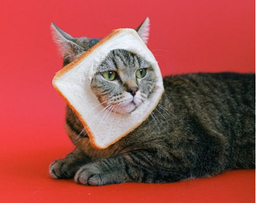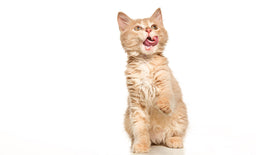How to handle Siamese cat food allergies effortlessly
Cats can be allergic to anything under the sun, so managing feline food allergies is quite stressful. From handling gastrointestinal upsets to adding and removing different food from their menu, the process drains you out.
Your Siamese cat’s food allergies can be a perpetual source of confusion because these kitties are at a higher risk of developing food allergies than other breeds. To make matters worse, most Siamese cats have delicate digestive tracts, and frequent allergic episodes sensitise their stomach even further.
When it comes to diets tailored to the needs of allergy-prone kitties, vets recommend wet food prepared with whole meat and natural ingredients. Before looking into suitable products, we’ll help you understand:
- Common food allergies and intolerances in Siamese kitties
- How to manage these conditions with the right meal plan

I’m not sick, hooman, just a wee bit sensitive. Now can we get rid of this cone of shame?
Source: Leah Kelly
Siamese cat food allergies and intolerances—what’s the difference?
Siamese cats can have both food allergies and intolerances. It’s crucial to tell them apart in case of an emergency. The table below will help you recognise the differences:
|
Key elements |
Food allergy |
Food intolerance |
|
Description |
Your kitty’s immune system categorises a non-pathogenic element as a “foreign invader” and rejects it by releasing antibodies |
Your kitty lacks adequate enzymes to digest the food |
|
Symptoms |
|
|
|
Onset |
Symptoms appear soon after eating the food |
Symptoms occur a few hours after eating (within the feline digestion cycle of eight hours) |
|
Exposure |
Exposure to a small amount of allergen will trigger a reaction |
Most cats can eat a small quantity of the problematic food with no adverse reaction |
|
Severity |
Reactions can be life-threatening in extreme cases |
Symptoms are unpleasant but not deadly |
Your top priority should be to keep all problematic ingredients out of your Siamese kitty’s daily meals and snacks. Keep the portions low whenever you introduce new food to your pet to avoid triggering a severe reaction to a potential allergen.
Keep in mind that many Siamese cats can throw up because of their general eating habits. This breed tends to eat too fast because of their unique mouth shape, which causes overeating, stresses their stomach, and makes them throw up undigested food.

When you eat too fast and puke but make it to the carpet in time…
Source: boredpanda
What ingredients commonly trigger allergies or food intolerances in Siamese kitties?
Allergies and intolerances are individual, so it's difficult to predict what your kitty may react to. We have compiled some common food or ingredients that usually don't agree with this breed.
Lactose and casein in dairy
Many Siamese cats cannot handle milk and dairy products because of:
- Lactose—Kittens who are still being nursed can digest lactose (milk sugar), but they lose the necessary digestive enzymes once they start eating solids. Most adult cats cannot handle the lactose content in dairy treats like ice cream, yoghurt, and cream
- Casein—It’s common for kitties to be allergic to casein (protein in cow's milk). Unfortunately, many manufacturers add casein to cat food as a cheap protein source, making it unsafe for your cat
Besides regular milk, Siamese cats may also react adversely to soya, coconut, or almond milk because of individual intolerances.
Histamine
Most cats aren’t allergic to histamines in food, but Siamese may react to this chemical. Here are some high-histamine snacks your kitty should avoid:
Gluten
Gluten, like histamine, is not a common allergen for cats, but some Siamese cats tend to react to it.
It is a protein found in many grains and added to cat food to increase the content of the nutrient. Such proteins are suboptimal not only for Siamese but all breeds as cats are true carnivores hardwired to absorb proteins, vitamins, and minerals from whole meat.
If we’re talking snacks, avoid giving your sensitive kitty gluten-rich treats like bread, pasta, crisps, porridge, and cakes.
Raw meat
Raw food or B.A.R.F. diets are alternatives to wet food, but most vets don’t recommend them to any cat with a stomach sensitivity.
Raw meat, eggs, and bones can carry foodborne pathogens, which cannot completely be eliminated despite sanitary precautions. Exposure to contaminants leads to food poisoning and intestinal infections. Healthy cats who consume raw chicken or fish regularly can also develop stomach sensitivity due to low-grade exposure to pathogens over time.
Many Siamese kitties tend to be allergic to beef, whether raw or cooked.
Dry food
Many parents have reported their Siamese throwing up or rejecting dry food regularly. Top nutritionists believe that the culprits are processed meat and chemical additives in biscuits, which may trigger gastrointestinal problems in this breed. You should also lay off dry food as it can be a mix of several undefined or unspecified ingredients that don’t show up on the labels but can still cause allergic reactions in your kitty.
How to help a Siamese cat with stomach sensitivity or allergies
If your Siamese has a sensitive stomach, picking the right products can be a nightmare as nothing seems to work. Here are three popular ways to deal with this problem:
- Introducing novel proteins
- Using hydrolysed proteins
- Switching to hypoallergenic cat food
Novel protein and elimination diets—are they feasible?
The concept of novel proteins is simple—if your kitty is allergic to a particular ingredient (meat), eliminate it from their diet and give them something they have never tried before. You swap beef for pork, pork for turkey, turkey for rabbits and kangaroos, and when nothing works, you go for insect proteins. The whole thing can be a vicious cycle costing you a pretty penny.
While novel proteins can work, they’re not the most economical solution. What’s worse is that frequent diet changes can further sensitise your kitty’s tummy.

If you ever run out of protein options, maybe going back to basics is the answer. You can’t go wrong with whole meat.
Image (c) Untamed
Hydrolysed proteins can be risky
Hydrolysis of proteins means breaking down the nutrient into amino acid and peptide fragments so small that the feline immune system cannot recognise them as allergens. Hydrolysed proteins are commonly added to human food as flavour enhancers, but adding them to cat food is a relatively new practice.
There is no systematic research on the efficacy of hydrolysed proteins in feline allergy management. One study found that 50% of the pet subjects had aggravated allergy symptoms after consuming these proteins.
Cat food with hypoallergenic ingredients is the smartest choice
The feline digestive system functions optimally on whole meat, and average cat food contains anything but that. If your kitty reacts to a product with prawns as the protein source, the logical assumption would be that they are allergic to prawns when in reality, the culprit could be a taste enhancer or preservative added to the product.

Trojan horse in cat food—can you recognise the bad ingredients camouflaged in the labels?
Source: two_fried_sesame_balls
Cat food with hypoallergenic ingredients is a cost-effective solution to managing feline allergies. The products are made without harsh chemicals, food colourants, and taste enhancers, making them safer for feline consumption.
Even if a product is hypoallergenic, you should still pay attention to its ingredients. According to nutritionists, cat food should have more than 50% animal protein, not more than 20% fat, and under 3% carbs. Products with low meat content, or those loaded with fillers like grains and vegetables, will still stress your kitty’s system, even if they’re labelled as hypoallergenic.
Let your kitty try Untamed—our allergen-free meals are the best!
If your kitty needs a reliable, highly digestible wet food for regular consumption, you can’t go wrong with Untamed. Our whole-meat gravy and jelly products are made with natural ingredients that complement feline biology.
Untamed meals are perfect for kitties with a sensitive tummy because we:
- Use human-grade whole meat—We don’t want processed undefined meat and plant proteins ruining your kitty’s day. Our food has real, nutritious meat full of natural immunity-boosting micronutrients, such as taurine, iron, and vitamin E
- Gently steam our food—Overcooking makes meat tasteless, which is one of the reasons why some cats reject wet food. We keep the meat tender, increase its digestibility, and boost its natural aroma and flavours by steaming it
- Stick to allergen-free formulas—Vets have formulated our meals to ensure only the safest ingredients end up in our dishes. We use ethically sourced meat and fish free from the tummy-irritating hormones and contaminants found in many commercial products
If your kitty is prone to food allergies, get them our single protein meals:
- Chocka Chicken—made with hand-shredded chicken breast and a bit of liver for that burst of flavour
- Tuck-in Tuna—offers juicy (dolphin-safe) tuna simmered in delicious fish broth
Our meals include duck, salmon, mackerel, sardine, ham, and shrimp. With 60%–63% whole meat and fish, our dishes offer twice more protein than the industry average!
If your kitty is a taste-snob, we are the solution—fussy cats have feasted on our meals, and they went wild for Untamed! Take our TRY NOW quiz and tell us more about your kitty’s food preferences and allergies. We’ll send you a taster pack at a killer price!

Allergy agonies? You don’t have to think outside the box—whole meat is your kitty’s comfort zone!
Image (c) Untamed
Our balanced formulas work for all kitties!
Untamed’s sugar-free and grain-free formulas work for all cats irrespective of breed or life stage. Here’s how we help:
- Kittens—Untamed’s protein-dense meals can fulfil the high-caloric needs of growing kitties without triggering vomiting or diarrhoea. Pay attention to how much and how often your kitten eats to help them reach their target weight in due time
- Adults—Indoor or neutered cats can be overweight because of an inadequate diet, but not with Untamed. Our dishes are great for weight management! If your kitty is frail because of frequent gastric episodes, our high-protein food can easily bulk them up (when fed in adequate portions)
- Seniors—Stomach sensitivities can lead to rapid weight loss in ageing kitties. Our highly digestible food reduces barfing and helps seniors retain their appetite
Untamed also contributes to preventing and managing several feline illnesses, such as diabetes, struvite crystals, UTIs, and hyperthyroidism. You can notice the benefits of switching to our food from the start—here’s what our clients say:
|
Timeline |
Benefits |
|
One week |
|
|
Four months |
|
|
Six months and beyond |

Kitties always say yes to food that’s gentle on the tummy and tastes yummy!
Image (c) Untamed
Get used to comfy shopping with Untamed!
Another reason to go Untamed is our convenient and efficient subscription and delivery service for cat food! We deliver straight to your doorstep within a day of placing the order. All you have to do is:
- Take our TRY NOW quiz
- Tell us about your cat
- Select the products and place the order
If your kitty fancies more, we will deliver Untamed supplies every month and save you shopping time. Shipping for all our online cat food orders is free, and you can cancel or modify them at your convenience.
We are Carbon Neutral Certified, and our packaging is 100% recyclable.

![Best food for Ragdoll cats in the UK [Broken Down]](http://untamed.com/cdn/shop/articles/featured_best_food_for_ragdoll_cats_uk.jpg?v=1646818249&width=256)

